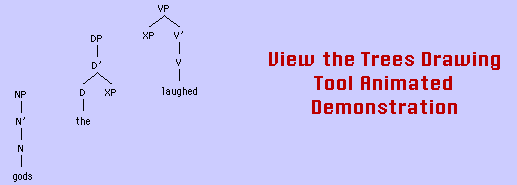
Trees 3
This program runs under Windows, Mac OSX and Linux (under WINE).
Trees (© Sean Crist and Tony Kroch) is easy-to-use software for drawing syntactic trees
and displaying them on screen and in documents. It implements a form of lexicalized Tree
Substitution Grammar, which allows the construction of phrase structure trees
in an intuitive way, and it supports applying grammatical movement rules to
syntactic trees to create syntactic derivations. Click on the above animation
for a demonstration of how the program works. Trees is
downloadable from this site.
Trees has several uses for
teachers and students of natural language syntax, including:
-
building trees and pasting them into word processing documents or web pages.
-
demonstrating syntactic structures and derivations in a computer-equipped
classroom.
-
constructing interactive exercises for use in homework assignments.
-
modeling syntactic analyses to demonstrate and informally test their
descriptive coverage.
The program works with grammar tool files that specify words, grammatical
structures, and processes of syntactic composition in lexicalized
(optionally) grammar fragments. These fragments can be written by program
users to suit their purposes and in pedagogical applications are normally
written by the teacher for use with an assignment. There are archives
available for downloading Trees which contain grammar tools and assignments
that have been used in introductory and intermediate courses at Penn and elsewhere.
Colin Phillips,
currently on the faculty of the University of Maryland, has been using Trees
in an introductory course and has written a review of an earlier Macintosh version
of the program, available here, that
appeared in number 3.7 of the linguistics newsletter GLOT
International (home page: http://www.glotinternational.com). The program is also
in use at the following universities: University of Delaware, University of
Edinburgh, Georgetown University, Michigan State University, University of
North Carolina, Rutgers University, Simon Fraser University, and University
of Wisconsin.
Trees supports a wide range of structures and composition processes. There
is special support for X-bar phrase structure but non X-bar structures are also
permitted. Transformational movement is supported but simple derivations in
Categorial Grammar, Generalized Phrase Structure Grammar, and Tree Adjoining
Grammar can also be modeled. The program does not currently support the display
of attribute-value matrices.
The program was developed under a grant from the University of Pennsylvania
School of Arts and Sciences Instructional Computing Development Fund and is
freely available to students and staff of the University of Pennsylvania. The
program is also freely available to students and staff at universities that
have purchased site licenses for the program.
Other users may download for evaluation purposes a demonstration version
of the program which will expire after 30 days. After the demo period, the
program must be purchased in order to continue functioning. The
fee for individual users is either $25 or $50, depending on the version of
the program purchased. For further information, please visit the
Trees download page.
Anyone who wishes to use the program in conjunction with a class must
purchase a multi-user site license. For further information on the cost and
conditions of a site license, click here.
[ Trees download page | Tony Kroch's home page
| Penn Linguistics home page ]